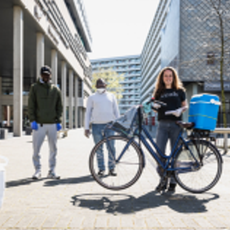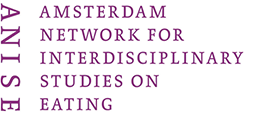
Food in times of crisis
Before the Covid-19 crisis, churches organized many activities in De Nieuwe Stad in Amsterdam Zuidoost, including serving free meals for everyone who wanted them. When this was no longer possible because of the Covid-19 measures, the international church, Treasures International Ministries, and Diaconie Evangelisch Lutherse Gemeente Amsterdam decided to work together and start delivering meals to people’s houses. Some of these recipients were enlisted through the network of one of the churches, but most were enlisted by care organizations. As one, relatively small project, operating alongside other aid initiatives, the meals project soon received many more enlistments than anticipated, and the Covid-19 crisis lasted longer than expected, which raised questions regarding the underlying needs and how to proceed in the long term.
Research question
Together with the Protestant Theological University, they decided to research the question:
How does the meals project of Treasures and Lutherse Diaconie expose structural needs in Amsterdam Zuidoost, and how can these needs be addressed in a sustainable manner?
Participatory action
This research is composed of two parts. For the first part, a participatory action research study was conducted, in which two researchers were actively involved in the meals project and aimed to explore possible answers to the research question together with a group of co-researchers: experts from the field. The project team (i.e. researchers and co-researchers) appears to be convinced that they are only helping people who really need the meals and that there are structural needs behind this; that the meals project is not just about meals, but that the meals are also a means for social contact with the recipients and for showing them love; that the project team fears they will have to stop the meals project because of limited financial means; and that the meals project turns out to be of high importance for the volunteers themselves, partly because some of them have gone from being receivers of help to providers of help.
Research study
The second part concerns a research study on the views of different stakeholders, based on interviews. Care organizations appear to be glad that their clients will have at least two healthy meals a week, and value the signaling function of the meals project highly. They would like to strengthen their cooperation to improve the situation for vulnerable people in Zuidoost. Interviews with representatives of some of the charitable funds make clear that they attach importance to providing support for emergency aid initiatives, yet this is beyond their regular strategy. Faced with a high number of applications in times of Covid-19, they seek to distribute their resources wisely (e.g. by working together with parties that are able to negotiate sharp prices for bulk procurement of foodstuffs). They encourage meals projects like this to critically look at whom they offer meals, and to refer those eligible to governmental social services whenever possible. They offer support in times of crisis, but not endlessly: the structural needs in Zuidoost call for structural solutions.
Results
This report discusses a number of vital issues and questions brought to light by the analysis of data collected in both parts of the research: whom to help? scaling up or scaling down? cooperation with other parties; reducing dependency and promoting empowerment; workload and room for reflection. Viewed in the wider context of diaconia and its core values, the meals project turns out to reflect eight typical and recurring tensions in diaconal projects. The study concludes that as a result of the meals project:
- people receive food aid who would lack food otherwise;
- people involved are empowered and lead more meaningful lives;
- structural need and injustice becomes visible; and
- the unique role of churches, the importance of their social capital and network of relationships in Amsterdam Zuidoost, becomes apparent.
It recommends stakeholders in this project as well as in the broader field – funds, diaconal organizations, the government, care organizations and organizations of social welfare:
- to get around the table and continue or start the dialogue on signals of social needs coming from these emergency aid projects
- to make sure that emergency aid projects are accompanied by an independent advisory board from the onset, to help projects with the reflection they long for
- to cooperate in structurally collecting signals about existing needs

